Fair Value Accounting: Pros and Cons
VerifiedAdded on 2022/12/28
|10
|2558
|35
AI Summary
This article discusses the concept of fair value accounting (FVA) in corporate accounting. It explains how FVA is used to determine the value of assets and liabilities based on present market values. The article explores the advantages and disadvantages of FVA, including its impact on transparency and procyclicality. It also examines the controversy surrounding FVA and its role in the subprime crisis. The article concludes by discussing the challenges and limitations of implementing FVA in financial reporting.
Contribute Materials
Your contribution can guide someone’s learning journey. Share your
documents today.
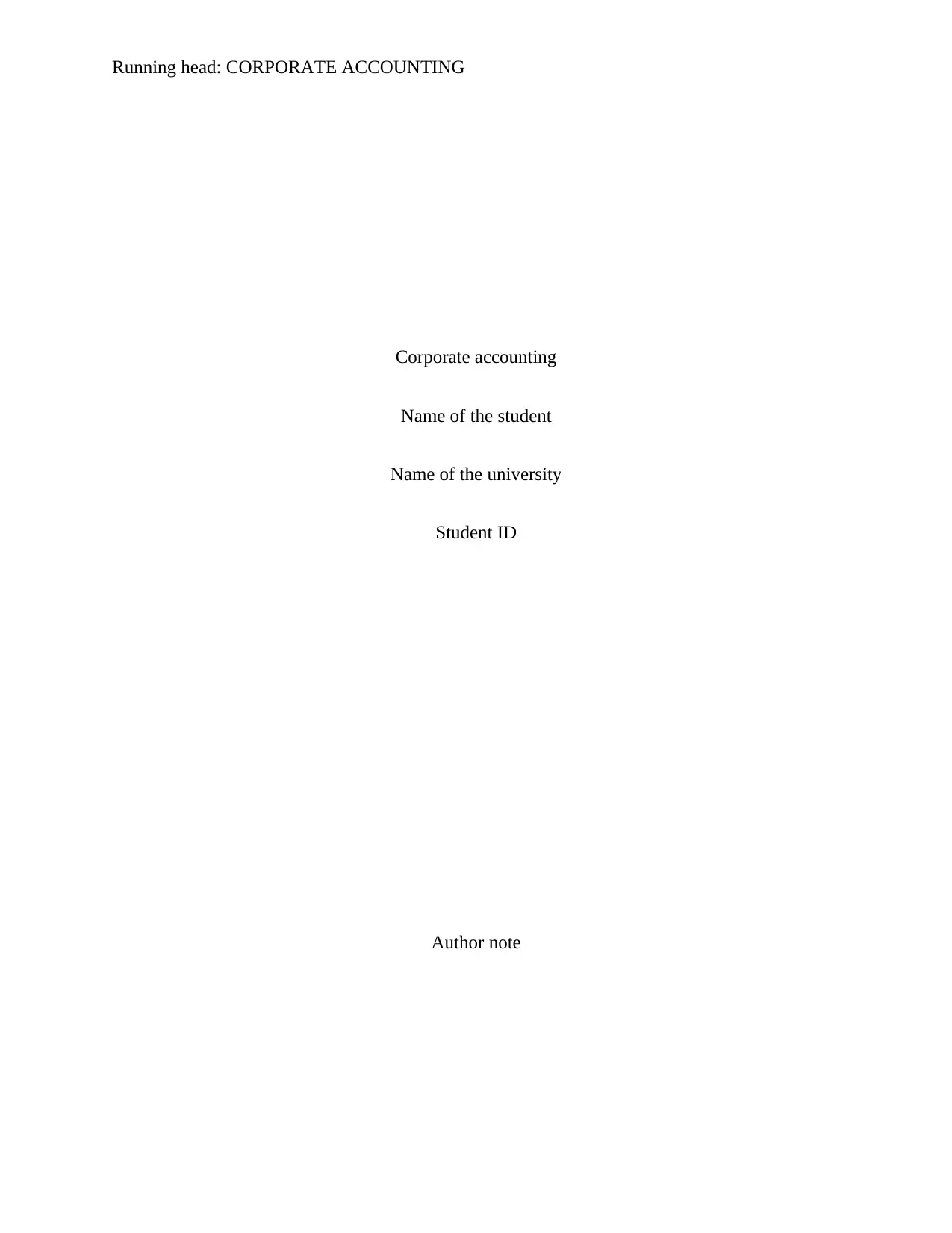
Running head: CORPORATE ACCOUNTING
Corporate accounting
Name of the student
Name of the university
Student ID
Author note
Corporate accounting
Name of the student
Name of the university
Student ID
Author note
Secure Best Marks with AI Grader
Need help grading? Try our AI Grader for instant feedback on your assignments.
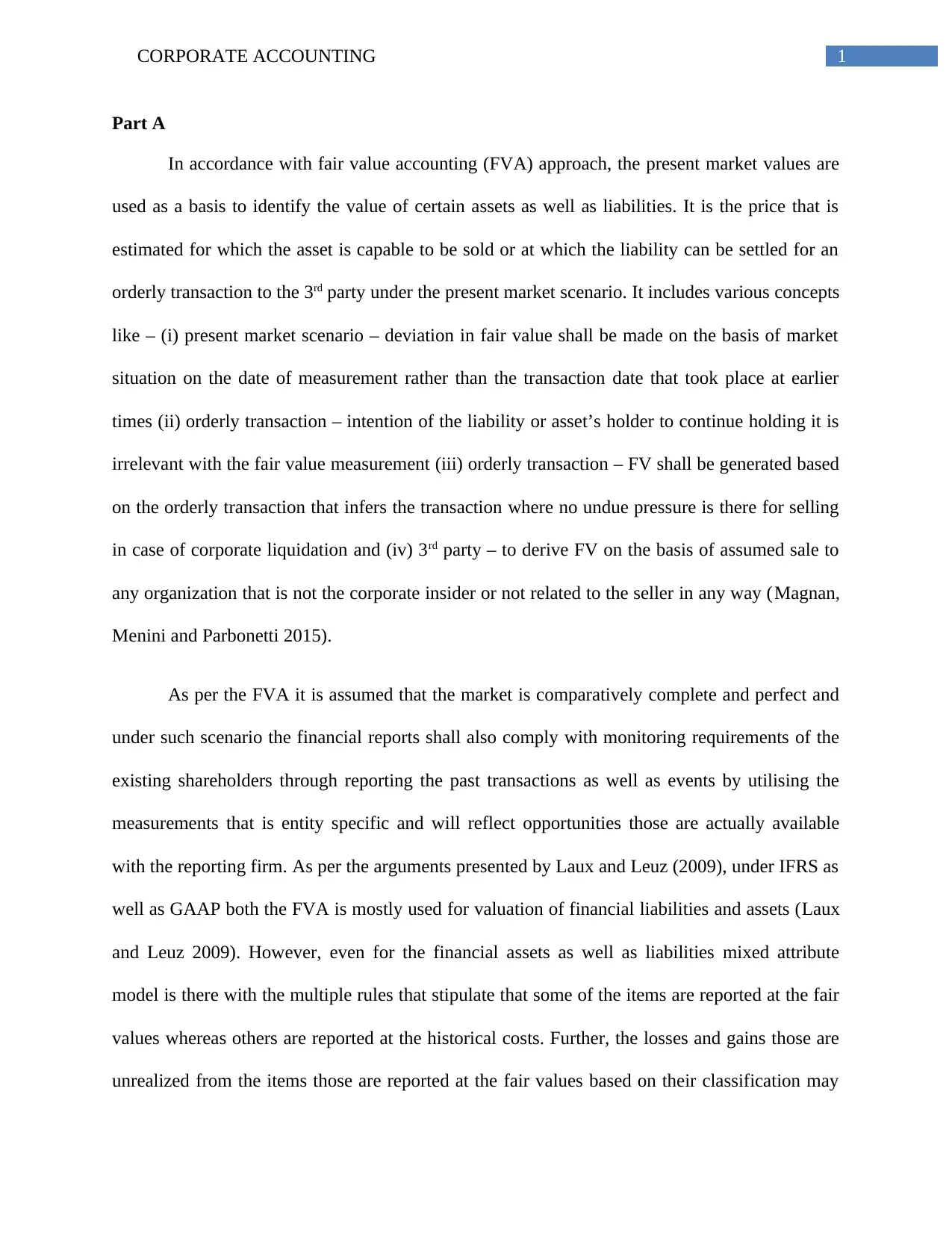
1CORPORATE ACCOUNTING
Part A
In accordance with fair value accounting (FVA) approach, the present market values are
used as a basis to identify the value of certain assets as well as liabilities. It is the price that is
estimated for which the asset is capable to be sold or at which the liability can be settled for an
orderly transaction to the 3rd party under the present market scenario. It includes various concepts
like – (i) present market scenario – deviation in fair value shall be made on the basis of market
situation on the date of measurement rather than the transaction date that took place at earlier
times (ii) orderly transaction – intention of the liability or asset’s holder to continue holding it is
irrelevant with the fair value measurement (iii) orderly transaction – FV shall be generated based
on the orderly transaction that infers the transaction where no undue pressure is there for selling
in case of corporate liquidation and (iv) 3rd party – to derive FV on the basis of assumed sale to
any organization that is not the corporate insider or not related to the seller in any way (Magnan,
Menini and Parbonetti 2015).
As per the FVA it is assumed that the market is comparatively complete and perfect and
under such scenario the financial reports shall also comply with monitoring requirements of the
existing shareholders through reporting the past transactions as well as events by utilising the
measurements that is entity specific and will reflect opportunities those are actually available
with the reporting firm. As per the arguments presented by Laux and Leuz (2009), under IFRS as
well as GAAP both the FVA is mostly used for valuation of financial liabilities and assets (Laux
and Leuz 2009). However, even for the financial assets as well as liabilities mixed attribute
model is there with the multiple rules that stipulate that some of the items are reported at the fair
values whereas others are reported at the historical costs. Further, the losses and gains those are
unrealized from the items those are reported at the fair values based on their classification may
Part A
In accordance with fair value accounting (FVA) approach, the present market values are
used as a basis to identify the value of certain assets as well as liabilities. It is the price that is
estimated for which the asset is capable to be sold or at which the liability can be settled for an
orderly transaction to the 3rd party under the present market scenario. It includes various concepts
like – (i) present market scenario – deviation in fair value shall be made on the basis of market
situation on the date of measurement rather than the transaction date that took place at earlier
times (ii) orderly transaction – intention of the liability or asset’s holder to continue holding it is
irrelevant with the fair value measurement (iii) orderly transaction – FV shall be generated based
on the orderly transaction that infers the transaction where no undue pressure is there for selling
in case of corporate liquidation and (iv) 3rd party – to derive FV on the basis of assumed sale to
any organization that is not the corporate insider or not related to the seller in any way (Magnan,
Menini and Parbonetti 2015).
As per the FVA it is assumed that the market is comparatively complete and perfect and
under such scenario the financial reports shall also comply with monitoring requirements of the
existing shareholders through reporting the past transactions as well as events by utilising the
measurements that is entity specific and will reflect opportunities those are actually available
with the reporting firm. As per the arguments presented by Laux and Leuz (2009), under IFRS as
well as GAAP both the FVA is mostly used for valuation of financial liabilities and assets (Laux
and Leuz 2009). However, even for the financial assets as well as liabilities mixed attribute
model is there with the multiple rules that stipulate that some of the items are reported at the fair
values whereas others are reported at the historical costs. Further, the losses and gains those are
unrealized from the items those are reported at the fair values based on their classification may
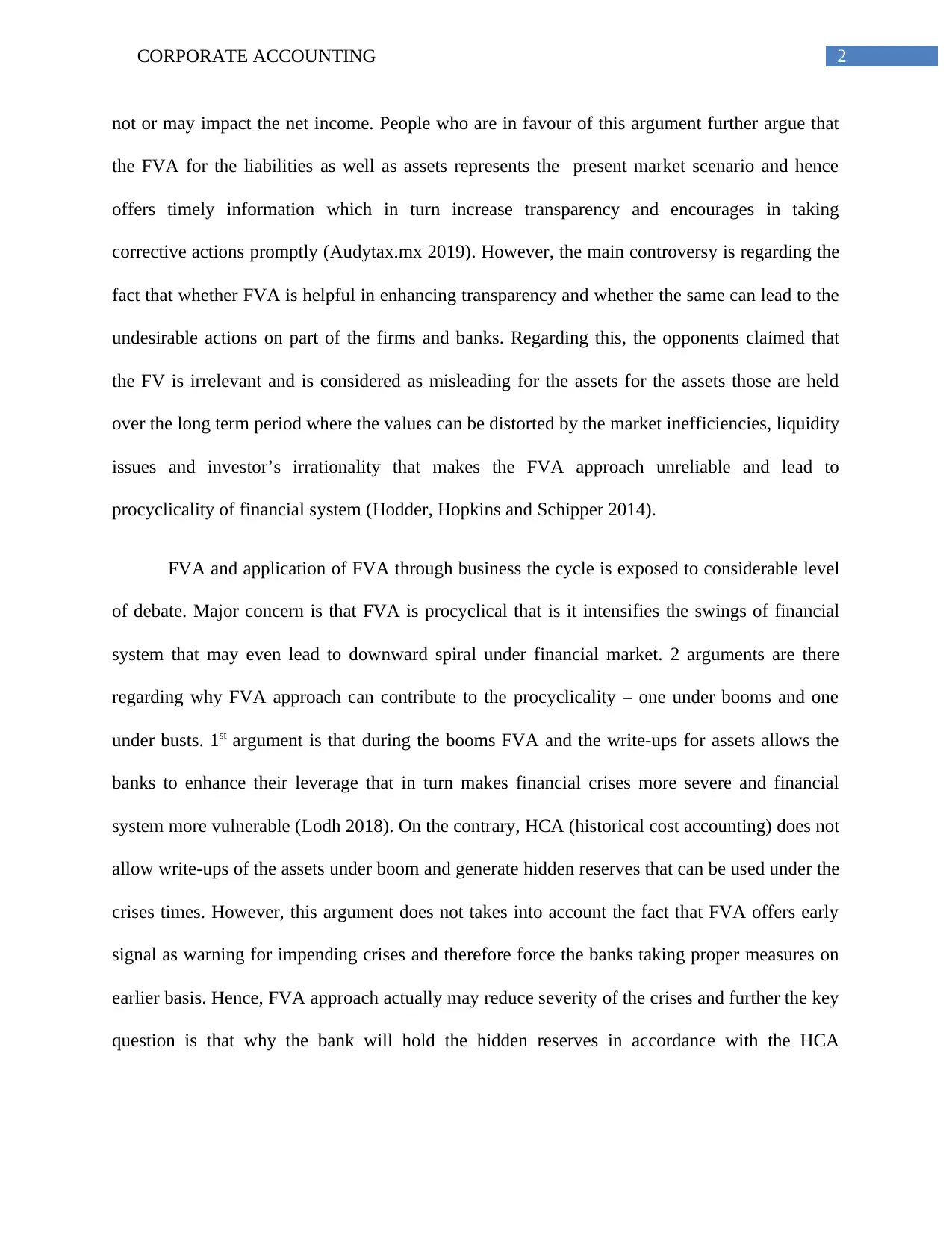
2CORPORATE ACCOUNTING
not or may impact the net income. People who are in favour of this argument further argue that
the FVA for the liabilities as well as assets represents the present market scenario and hence
offers timely information which in turn increase transparency and encourages in taking
corrective actions promptly (Audytax.mx 2019). However, the main controversy is regarding the
fact that whether FVA is helpful in enhancing transparency and whether the same can lead to the
undesirable actions on part of the firms and banks. Regarding this, the opponents claimed that
the FV is irrelevant and is considered as misleading for the assets for the assets those are held
over the long term period where the values can be distorted by the market inefficiencies, liquidity
issues and investor’s irrationality that makes the FVA approach unreliable and lead to
procyclicality of financial system (Hodder, Hopkins and Schipper 2014).
FVA and application of FVA through business the cycle is exposed to considerable level
of debate. Major concern is that FVA is procyclical that is it intensifies the swings of financial
system that may even lead to downward spiral under financial market. 2 arguments are there
regarding why FVA approach can contribute to the procyclicality – one under booms and one
under busts. 1st argument is that during the booms FVA and the write-ups for assets allows the
banks to enhance their leverage that in turn makes financial crises more severe and financial
system more vulnerable (Lodh 2018). On the contrary, HCA (historical cost accounting) does not
allow write-ups of the assets under boom and generate hidden reserves that can be used under the
crises times. However, this argument does not takes into account the fact that FVA offers early
signal as warning for impending crises and therefore force the banks taking proper measures on
earlier basis. Hence, FVA approach actually may reduce severity of the crises and further the key
question is that why the bank will hold the hidden reserves in accordance with the HCA
not or may impact the net income. People who are in favour of this argument further argue that
the FVA for the liabilities as well as assets represents the present market scenario and hence
offers timely information which in turn increase transparency and encourages in taking
corrective actions promptly (Audytax.mx 2019). However, the main controversy is regarding the
fact that whether FVA is helpful in enhancing transparency and whether the same can lead to the
undesirable actions on part of the firms and banks. Regarding this, the opponents claimed that
the FV is irrelevant and is considered as misleading for the assets for the assets those are held
over the long term period where the values can be distorted by the market inefficiencies, liquidity
issues and investor’s irrationality that makes the FVA approach unreliable and lead to
procyclicality of financial system (Hodder, Hopkins and Schipper 2014).
FVA and application of FVA through business the cycle is exposed to considerable level
of debate. Major concern is that FVA is procyclical that is it intensifies the swings of financial
system that may even lead to downward spiral under financial market. 2 arguments are there
regarding why FVA approach can contribute to the procyclicality – one under booms and one
under busts. 1st argument is that during the booms FVA and the write-ups for assets allows the
banks to enhance their leverage that in turn makes financial crises more severe and financial
system more vulnerable (Lodh 2018). On the contrary, HCA (historical cost accounting) does not
allow write-ups of the assets under boom and generate hidden reserves that can be used under the
crises times. However, this argument does not takes into account the fact that FVA offers early
signal as warning for impending crises and therefore force the banks taking proper measures on
earlier basis. Hence, FVA approach actually may reduce severity of the crises and further the key
question is that why the bank will hold the hidden reserves in accordance with the HCA
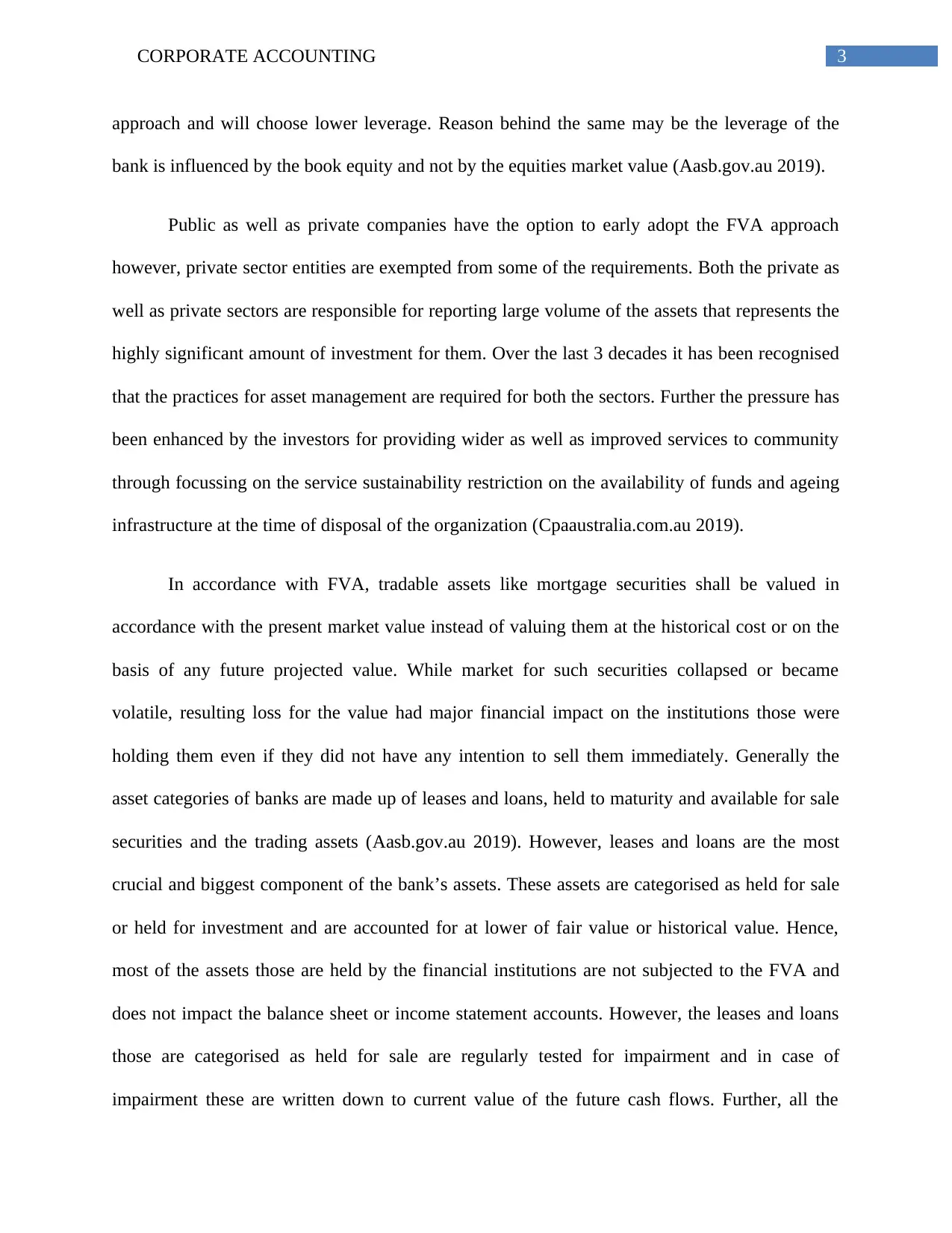
3CORPORATE ACCOUNTING
approach and will choose lower leverage. Reason behind the same may be the leverage of the
bank is influenced by the book equity and not by the equities market value (Aasb.gov.au 2019).
Public as well as private companies have the option to early adopt the FVA approach
however, private sector entities are exempted from some of the requirements. Both the private as
well as private sectors are responsible for reporting large volume of the assets that represents the
highly significant amount of investment for them. Over the last 3 decades it has been recognised
that the practices for asset management are required for both the sectors. Further the pressure has
been enhanced by the investors for providing wider as well as improved services to community
through focussing on the service sustainability restriction on the availability of funds and ageing
infrastructure at the time of disposal of the organization (Cpaaustralia.com.au 2019).
In accordance with FVA, tradable assets like mortgage securities shall be valued in
accordance with the present market value instead of valuing them at the historical cost or on the
basis of any future projected value. While market for such securities collapsed or became
volatile, resulting loss for the value had major financial impact on the institutions those were
holding them even if they did not have any intention to sell them immediately. Generally the
asset categories of banks are made up of leases and loans, held to maturity and available for sale
securities and the trading assets (Aasb.gov.au 2019). However, leases and loans are the most
crucial and biggest component of the bank’s assets. These assets are categorised as held for sale
or held for investment and are accounted for at lower of fair value or historical value. Hence,
most of the assets those are held by the financial institutions are not subjected to the FVA and
does not impact the balance sheet or income statement accounts. However, the leases and loans
those are categorised as held for sale are regularly tested for impairment and in case of
impairment these are written down to current value of the future cash flows. Further, all the
approach and will choose lower leverage. Reason behind the same may be the leverage of the
bank is influenced by the book equity and not by the equities market value (Aasb.gov.au 2019).
Public as well as private companies have the option to early adopt the FVA approach
however, private sector entities are exempted from some of the requirements. Both the private as
well as private sectors are responsible for reporting large volume of the assets that represents the
highly significant amount of investment for them. Over the last 3 decades it has been recognised
that the practices for asset management are required for both the sectors. Further the pressure has
been enhanced by the investors for providing wider as well as improved services to community
through focussing on the service sustainability restriction on the availability of funds and ageing
infrastructure at the time of disposal of the organization (Cpaaustralia.com.au 2019).
In accordance with FVA, tradable assets like mortgage securities shall be valued in
accordance with the present market value instead of valuing them at the historical cost or on the
basis of any future projected value. While market for such securities collapsed or became
volatile, resulting loss for the value had major financial impact on the institutions those were
holding them even if they did not have any intention to sell them immediately. Generally the
asset categories of banks are made up of leases and loans, held to maturity and available for sale
securities and the trading assets (Aasb.gov.au 2019). However, leases and loans are the most
crucial and biggest component of the bank’s assets. These assets are categorised as held for sale
or held for investment and are accounted for at lower of fair value or historical value. Hence,
most of the assets those are held by the financial institutions are not subjected to the FVA and
does not impact the balance sheet or income statement accounts. However, the leases and loans
those are categorised as held for sale are regularly tested for impairment and in case of
impairment these are written down to current value of the future cash flows. Further, all the
Secure Best Marks with AI Grader
Need help grading? Try our AI Grader for instant feedback on your assignments.
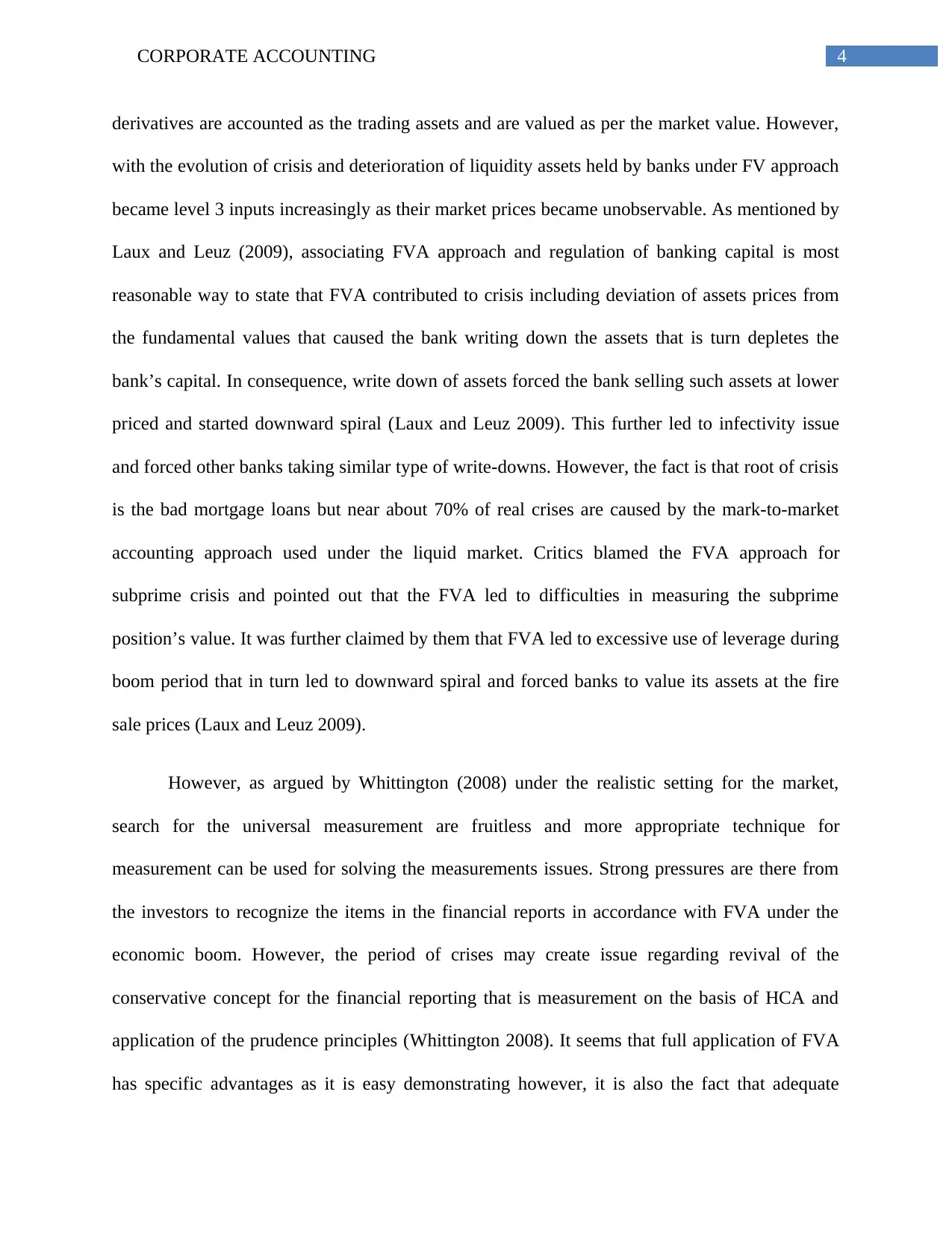
4CORPORATE ACCOUNTING
derivatives are accounted as the trading assets and are valued as per the market value. However,
with the evolution of crisis and deterioration of liquidity assets held by banks under FV approach
became level 3 inputs increasingly as their market prices became unobservable. As mentioned by
Laux and Leuz (2009), associating FVA approach and regulation of banking capital is most
reasonable way to state that FVA contributed to crisis including deviation of assets prices from
the fundamental values that caused the bank writing down the assets that is turn depletes the
bank’s capital. In consequence, write down of assets forced the bank selling such assets at lower
priced and started downward spiral (Laux and Leuz 2009). This further led to infectivity issue
and forced other banks taking similar type of write-downs. However, the fact is that root of crisis
is the bad mortgage loans but near about 70% of real crises are caused by the mark-to-market
accounting approach used under the liquid market. Critics blamed the FVA approach for
subprime crisis and pointed out that the FVA led to difficulties in measuring the subprime
position’s value. It was further claimed by them that FVA led to excessive use of leverage during
boom period that in turn led to downward spiral and forced banks to value its assets at the fire
sale prices (Laux and Leuz 2009).
However, as argued by Whittington (2008) under the realistic setting for the market,
search for the universal measurement are fruitless and more appropriate technique for
measurement can be used for solving the measurements issues. Strong pressures are there from
the investors to recognize the items in the financial reports in accordance with FVA under the
economic boom. However, the period of crises may create issue regarding revival of the
conservative concept for the financial reporting that is measurement on the basis of HCA and
application of the prudence principles (Whittington 2008). It seems that full application of FVA
has specific advantages as it is easy demonstrating however, it is also the fact that adequate
derivatives are accounted as the trading assets and are valued as per the market value. However,
with the evolution of crisis and deterioration of liquidity assets held by banks under FV approach
became level 3 inputs increasingly as their market prices became unobservable. As mentioned by
Laux and Leuz (2009), associating FVA approach and regulation of banking capital is most
reasonable way to state that FVA contributed to crisis including deviation of assets prices from
the fundamental values that caused the bank writing down the assets that is turn depletes the
bank’s capital. In consequence, write down of assets forced the bank selling such assets at lower
priced and started downward spiral (Laux and Leuz 2009). This further led to infectivity issue
and forced other banks taking similar type of write-downs. However, the fact is that root of crisis
is the bad mortgage loans but near about 70% of real crises are caused by the mark-to-market
accounting approach used under the liquid market. Critics blamed the FVA approach for
subprime crisis and pointed out that the FVA led to difficulties in measuring the subprime
position’s value. It was further claimed by them that FVA led to excessive use of leverage during
boom period that in turn led to downward spiral and forced banks to value its assets at the fire
sale prices (Laux and Leuz 2009).
However, as argued by Whittington (2008) under the realistic setting for the market,
search for the universal measurement are fruitless and more appropriate technique for
measurement can be used for solving the measurements issues. Strong pressures are there from
the investors to recognize the items in the financial reports in accordance with FVA under the
economic boom. However, the period of crises may create issue regarding revival of the
conservative concept for the financial reporting that is measurement on the basis of HCA and
application of the prudence principles (Whittington 2008). It seems that full application of FVA
has specific advantages as it is easy demonstrating however, it is also the fact that adequate
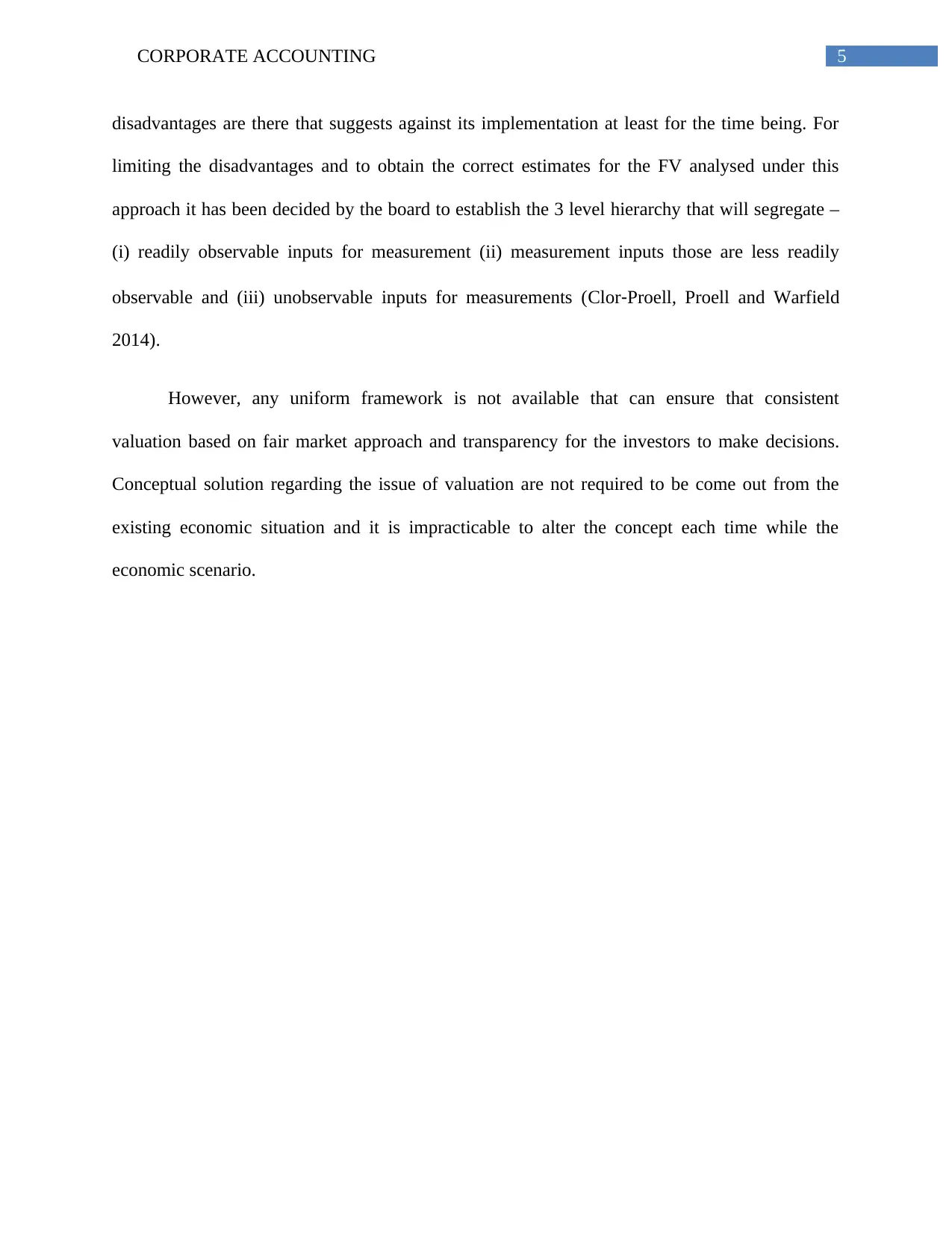
5CORPORATE ACCOUNTING
disadvantages are there that suggests against its implementation at least for the time being. For
limiting the disadvantages and to obtain the correct estimates for the FV analysed under this
approach it has been decided by the board to establish the 3 level hierarchy that will segregate –
(i) readily observable inputs for measurement (ii) measurement inputs those are less readily
observable and (iii) unobservable inputs for measurements (Clor‐Proell, Proell and Warfield
2014).
However, any uniform framework is not available that can ensure that consistent
valuation based on fair market approach and transparency for the investors to make decisions.
Conceptual solution regarding the issue of valuation are not required to be come out from the
existing economic situation and it is impracticable to alter the concept each time while the
economic scenario.
disadvantages are there that suggests against its implementation at least for the time being. For
limiting the disadvantages and to obtain the correct estimates for the FV analysed under this
approach it has been decided by the board to establish the 3 level hierarchy that will segregate –
(i) readily observable inputs for measurement (ii) measurement inputs those are less readily
observable and (iii) unobservable inputs for measurements (Clor‐Proell, Proell and Warfield
2014).
However, any uniform framework is not available that can ensure that consistent
valuation based on fair market approach and transparency for the investors to make decisions.
Conceptual solution regarding the issue of valuation are not required to be come out from the
existing economic situation and it is impracticable to alter the concept each time while the
economic scenario.
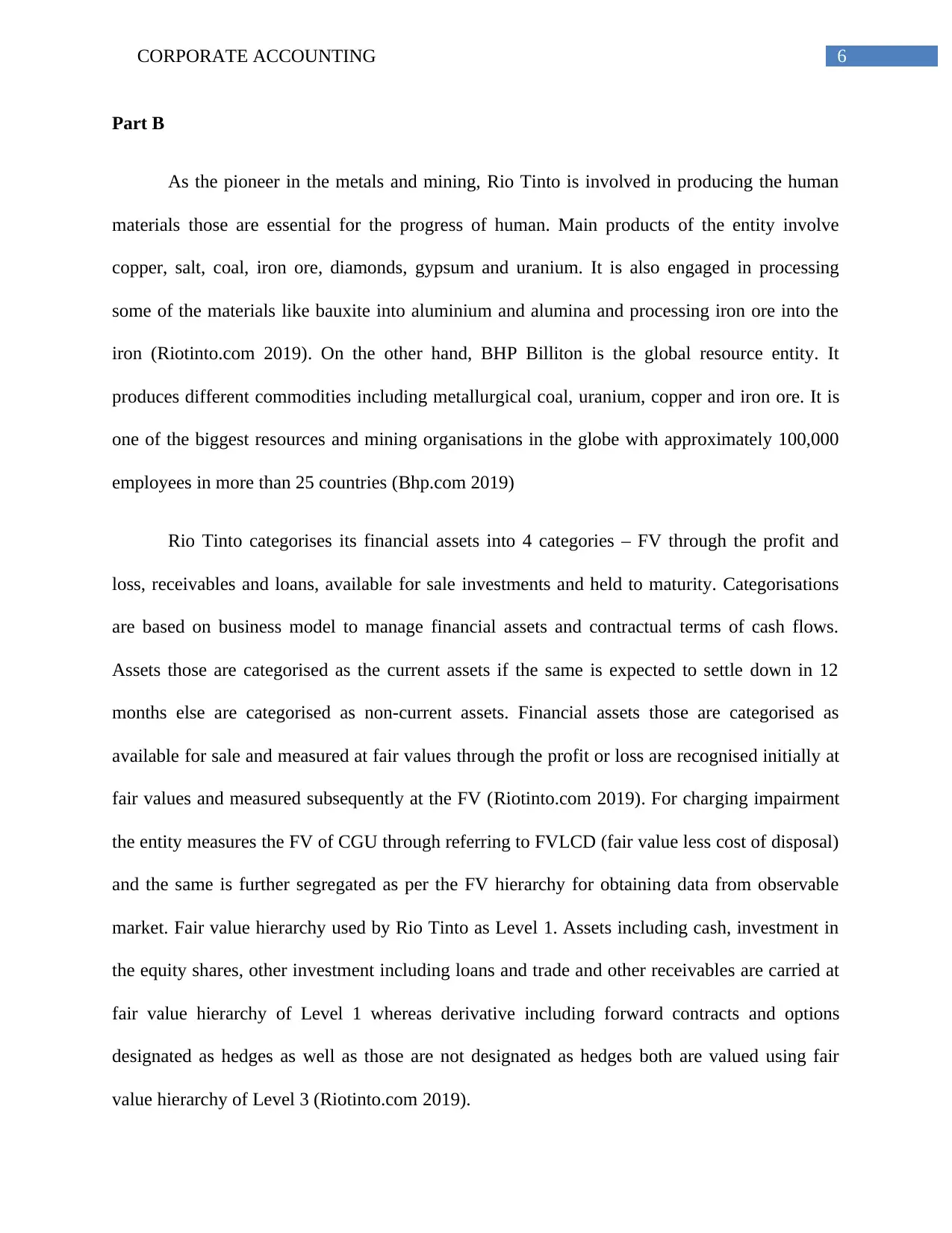
6CORPORATE ACCOUNTING
Part B
As the pioneer in the metals and mining, Rio Tinto is involved in producing the human
materials those are essential for the progress of human. Main products of the entity involve
copper, salt, coal, iron ore, diamonds, gypsum and uranium. It is also engaged in processing
some of the materials like bauxite into aluminium and alumina and processing iron ore into the
iron (Riotinto.com 2019). On the other hand, BHP Billiton is the global resource entity. It
produces different commodities including metallurgical coal, uranium, copper and iron ore. It is
one of the biggest resources and mining organisations in the globe with approximately 100,000
employees in more than 25 countries (Bhp.com 2019)
Rio Tinto categorises its financial assets into 4 categories – FV through the profit and
loss, receivables and loans, available for sale investments and held to maturity. Categorisations
are based on business model to manage financial assets and contractual terms of cash flows.
Assets those are categorised as the current assets if the same is expected to settle down in 12
months else are categorised as non-current assets. Financial assets those are categorised as
available for sale and measured at fair values through the profit or loss are recognised initially at
fair values and measured subsequently at the FV (Riotinto.com 2019). For charging impairment
the entity measures the FV of CGU through referring to FVLCD (fair value less cost of disposal)
and the same is further segregated as per the FV hierarchy for obtaining data from observable
market. Fair value hierarchy used by Rio Tinto as Level 1. Assets including cash, investment in
the equity shares, other investment including loans and trade and other receivables are carried at
fair value hierarchy of Level 1 whereas derivative including forward contracts and options
designated as hedges as well as those are not designated as hedges both are valued using fair
value hierarchy of Level 3 (Riotinto.com 2019).
Part B
As the pioneer in the metals and mining, Rio Tinto is involved in producing the human
materials those are essential for the progress of human. Main products of the entity involve
copper, salt, coal, iron ore, diamonds, gypsum and uranium. It is also engaged in processing
some of the materials like bauxite into aluminium and alumina and processing iron ore into the
iron (Riotinto.com 2019). On the other hand, BHP Billiton is the global resource entity. It
produces different commodities including metallurgical coal, uranium, copper and iron ore. It is
one of the biggest resources and mining organisations in the globe with approximately 100,000
employees in more than 25 countries (Bhp.com 2019)
Rio Tinto categorises its financial assets into 4 categories – FV through the profit and
loss, receivables and loans, available for sale investments and held to maturity. Categorisations
are based on business model to manage financial assets and contractual terms of cash flows.
Assets those are categorised as the current assets if the same is expected to settle down in 12
months else are categorised as non-current assets. Financial assets those are categorised as
available for sale and measured at fair values through the profit or loss are recognised initially at
fair values and measured subsequently at the FV (Riotinto.com 2019). For charging impairment
the entity measures the FV of CGU through referring to FVLCD (fair value less cost of disposal)
and the same is further segregated as per the FV hierarchy for obtaining data from observable
market. Fair value hierarchy used by Rio Tinto as Level 1. Assets including cash, investment in
the equity shares, other investment including loans and trade and other receivables are carried at
fair value hierarchy of Level 1 whereas derivative including forward contracts and options
designated as hedges as well as those are not designated as hedges both are valued using fair
value hierarchy of Level 3 (Riotinto.com 2019).
Paraphrase This Document
Need a fresh take? Get an instant paraphrase of this document with our AI Paraphraser
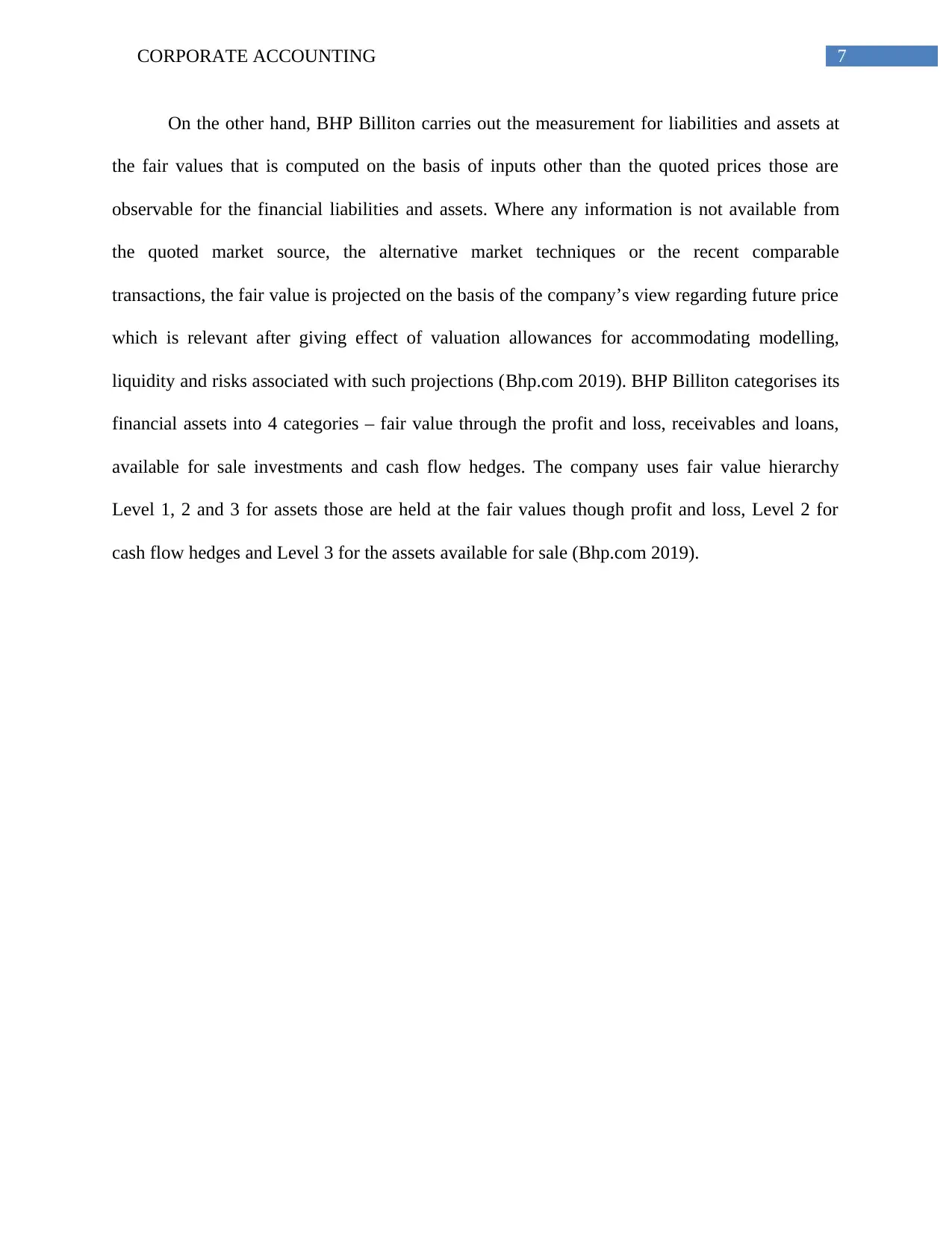
7CORPORATE ACCOUNTING
On the other hand, BHP Billiton carries out the measurement for liabilities and assets at
the fair values that is computed on the basis of inputs other than the quoted prices those are
observable for the financial liabilities and assets. Where any information is not available from
the quoted market source, the alternative market techniques or the recent comparable
transactions, the fair value is projected on the basis of the company’s view regarding future price
which is relevant after giving effect of valuation allowances for accommodating modelling,
liquidity and risks associated with such projections (Bhp.com 2019). BHP Billiton categorises its
financial assets into 4 categories – fair value through the profit and loss, receivables and loans,
available for sale investments and cash flow hedges. The company uses fair value hierarchy
Level 1, 2 and 3 for assets those are held at the fair values though profit and loss, Level 2 for
cash flow hedges and Level 3 for the assets available for sale (Bhp.com 2019).
On the other hand, BHP Billiton carries out the measurement for liabilities and assets at
the fair values that is computed on the basis of inputs other than the quoted prices those are
observable for the financial liabilities and assets. Where any information is not available from
the quoted market source, the alternative market techniques or the recent comparable
transactions, the fair value is projected on the basis of the company’s view regarding future price
which is relevant after giving effect of valuation allowances for accommodating modelling,
liquidity and risks associated with such projections (Bhp.com 2019). BHP Billiton categorises its
financial assets into 4 categories – fair value through the profit and loss, receivables and loans,
available for sale investments and cash flow hedges. The company uses fair value hierarchy
Level 1, 2 and 3 for assets those are held at the fair values though profit and loss, Level 2 for
cash flow hedges and Level 3 for the assets available for sale (Bhp.com 2019).
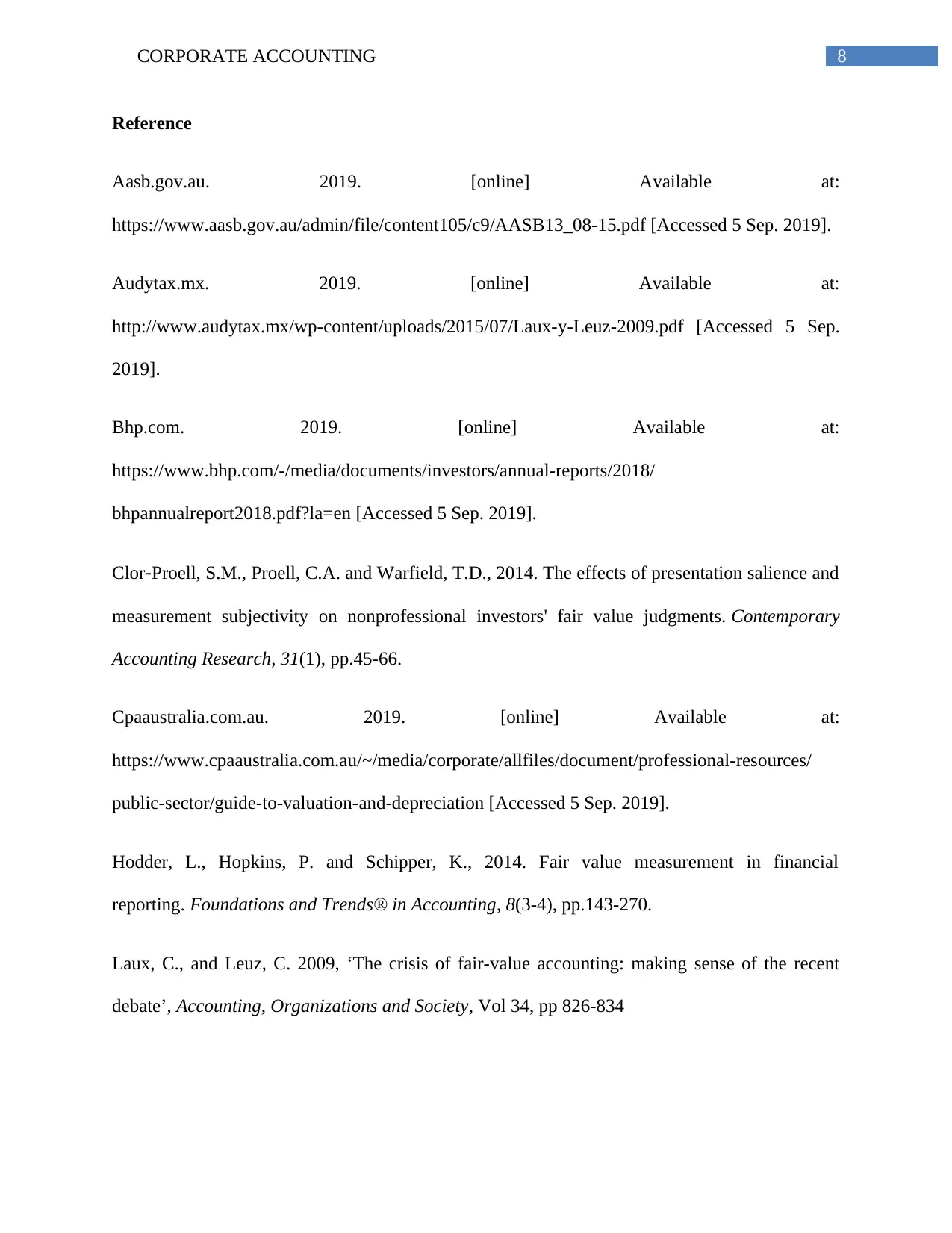
8CORPORATE ACCOUNTING
Reference
Aasb.gov.au. 2019. [online] Available at:
https://www.aasb.gov.au/admin/file/content105/c9/AASB13_08-15.pdf [Accessed 5 Sep. 2019].
Audytax.mx. 2019. [online] Available at:
http://www.audytax.mx/wp-content/uploads/2015/07/Laux-y-Leuz-2009.pdf [Accessed 5 Sep.
2019].
Bhp.com. 2019. [online] Available at:
https://www.bhp.com/-/media/documents/investors/annual-reports/2018/
bhpannualreport2018.pdf?la=en [Accessed 5 Sep. 2019].
Clor‐Proell, S.M., Proell, C.A. and Warfield, T.D., 2014. The effects of presentation salience and
measurement subjectivity on nonprofessional investors' fair value judgments. Contemporary
Accounting Research, 31(1), pp.45-66.
Cpaaustralia.com.au. 2019. [online] Available at:
https://www.cpaaustralia.com.au/~/media/corporate/allfiles/document/professional-resources/
public-sector/guide-to-valuation-and-depreciation [Accessed 5 Sep. 2019].
Hodder, L., Hopkins, P. and Schipper, K., 2014. Fair value measurement in financial
reporting. Foundations and Trends® in Accounting, 8(3-4), pp.143-270.
Laux, C., and Leuz, C. 2009, ‘The crisis of fair-value accounting: making sense of the recent
debate’, Accounting, Organizations and Society, Vol 34, pp 826-834
Reference
Aasb.gov.au. 2019. [online] Available at:
https://www.aasb.gov.au/admin/file/content105/c9/AASB13_08-15.pdf [Accessed 5 Sep. 2019].
Audytax.mx. 2019. [online] Available at:
http://www.audytax.mx/wp-content/uploads/2015/07/Laux-y-Leuz-2009.pdf [Accessed 5 Sep.
2019].
Bhp.com. 2019. [online] Available at:
https://www.bhp.com/-/media/documents/investors/annual-reports/2018/
bhpannualreport2018.pdf?la=en [Accessed 5 Sep. 2019].
Clor‐Proell, S.M., Proell, C.A. and Warfield, T.D., 2014. The effects of presentation salience and
measurement subjectivity on nonprofessional investors' fair value judgments. Contemporary
Accounting Research, 31(1), pp.45-66.
Cpaaustralia.com.au. 2019. [online] Available at:
https://www.cpaaustralia.com.au/~/media/corporate/allfiles/document/professional-resources/
public-sector/guide-to-valuation-and-depreciation [Accessed 5 Sep. 2019].
Hodder, L., Hopkins, P. and Schipper, K., 2014. Fair value measurement in financial
reporting. Foundations and Trends® in Accounting, 8(3-4), pp.143-270.
Laux, C., and Leuz, C. 2009, ‘The crisis of fair-value accounting: making sense of the recent
debate’, Accounting, Organizations and Society, Vol 34, pp 826-834
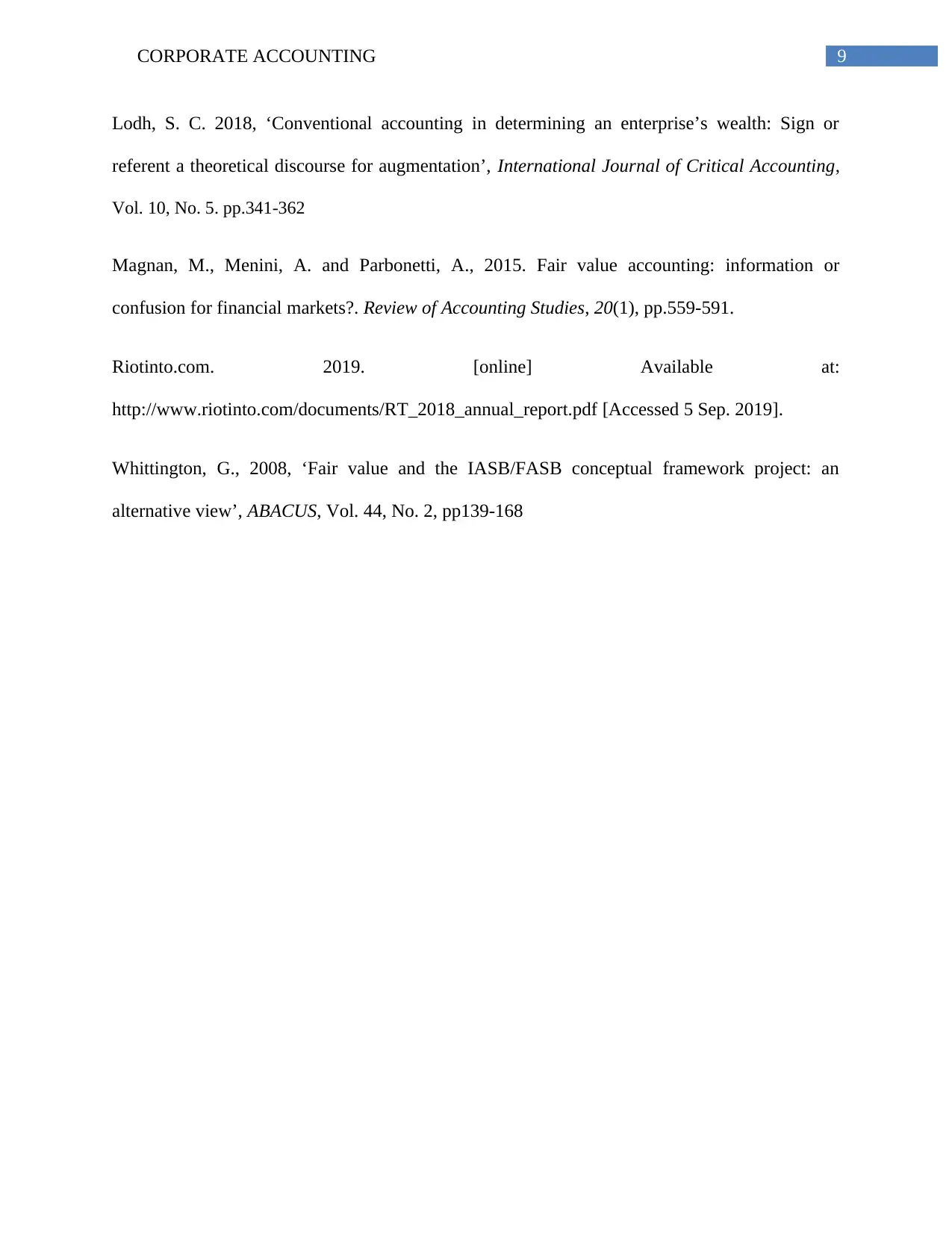
9CORPORATE ACCOUNTING
Lodh, S. C. 2018, ‘Conventional accounting in determining an enterprise’s wealth: Sign or
referent a theoretical discourse for augmentation’, International Journal of Critical Accounting,
Vol. 10, No. 5. pp.341-362
Magnan, M., Menini, A. and Parbonetti, A., 2015. Fair value accounting: information or
confusion for financial markets?. Review of Accounting Studies, 20(1), pp.559-591.
Riotinto.com. 2019. [online] Available at:
http://www.riotinto.com/documents/RT_2018_annual_report.pdf [Accessed 5 Sep. 2019].
Whittington, G., 2008, ‘Fair value and the IASB/FASB conceptual framework project: an
alternative view’, ABACUS, Vol. 44, No. 2, pp139-168
Lodh, S. C. 2018, ‘Conventional accounting in determining an enterprise’s wealth: Sign or
referent a theoretical discourse for augmentation’, International Journal of Critical Accounting,
Vol. 10, No. 5. pp.341-362
Magnan, M., Menini, A. and Parbonetti, A., 2015. Fair value accounting: information or
confusion for financial markets?. Review of Accounting Studies, 20(1), pp.559-591.
Riotinto.com. 2019. [online] Available at:
http://www.riotinto.com/documents/RT_2018_annual_report.pdf [Accessed 5 Sep. 2019].
Whittington, G., 2008, ‘Fair value and the IASB/FASB conceptual framework project: an
alternative view’, ABACUS, Vol. 44, No. 2, pp139-168
1 out of 10
Related Documents
Your All-in-One AI-Powered Toolkit for Academic Success.
+13062052269
info@desklib.com
Available 24*7 on WhatsApp / Email
![[object Object]](/_next/static/media/star-bottom.7253800d.svg)
Unlock your academic potential
© 2024 | Zucol Services PVT LTD | All rights reserved.





